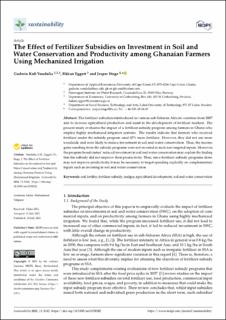The effect of fertilizer subsidies on investment in soil and water conservation and productivity among ghanaian farmers using mechanized irrigation
Peer reviewed, Journal article
Published version

View/
Date
2021Metadata
Show full item recordCollections
- Publikasjoner fra Cristin - NIVA [2148]
- Scientific publications [1172]
Abstract
The fertilizer subsidies reintroduced in various sub-Saharan African countries from 2007 aim to increase agricultural production and assist in the development of fertilizer markets. The present study evaluates the impact of a fertilizer subsidy program among farmers in Ghana who employ highly mechanized irrigation systems. The results indicate that farmers who received fertilizer under the subsidy program used 45% more fertilizer. However, they did not use more weedicide and were likely to reduce investment in soil and water conservation. Thus, the income gains resulting from the subsidy programs were not invested in such non-targeted inputs. Moreover, the program beneficiaries’ reduced investment in soil and water conservation may explain the finding that the subsidy did not improve their productivity. Thus, since fertilizer subsidy programs alone may not improve productivity, it may be necessary to target spending explicitly on complementary inputs such as investing in soil and water conservation.
